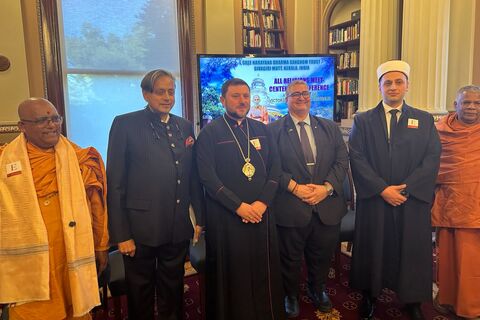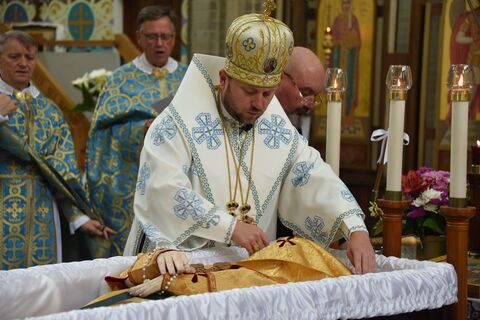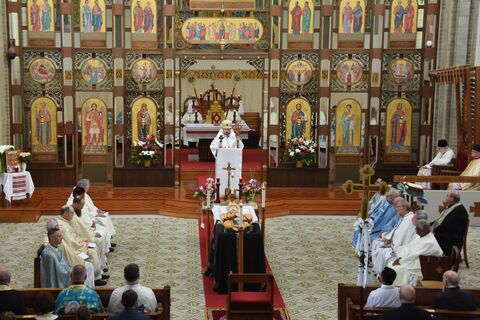Speech by Bishop Mykola Cardinal Bychok at the First Annual Eparchial Appeal Dinner inToronto, Canada
September 13, 2025
On Thursday, September 11, Bishop Mykola Cardinal Bychok, Eparch of Melbourne, served as a guest speaker at the First Annual Eparchial Appeal Dinner in Toronto while on his visit to Canada. In his address, he reflected on the dignity and mission of the Christian family in the face of war, emigration, and historical persecution. Bishop Mykola emphasised that the family remains a source of faith, hope, and love — even in the darkest of times.

Speech by Bishop Mykola Cardinal Bychok at the First Annual Eparchial Appeal Dinner inToronto, Canada
11 September 2025
Your Eminences, Dear Brother Bishops, Reverend Fathers, Sisters, Distinguished Guests, Brothers and Sisters in Christ,
Glory to Jesus Christ!
I am extremely pleased to be here with you in Toronto. Today, we are participating in a truly historic event — the First Annual Eparchial Appeal Dinner.
The uniqueness of this event lies not only in the fact that it is happening for the first time, but also in the fact that today we have all gathered to make a significant and visible contribution to the development and support of the family.
Each of you today, through your donation, is bringing closer the opening of such an important centre for helping families — a Family and Life office.
With sincere gratitude for the fact that, despite your personal responsibilities and affairs, despite your daily concerns, you have found the time to be here, I address you today to share my thoughts on the dignity and mission of the Christian family — in the light of our faith, our history, and our painful present.
In October 1997, during a General Audience, Pope John Paul II said, “Whoever promotes the development of the family promotes the development of the person; whoever attacks the family attacks the person.” These words, spoken almost 30 years ago, are extremely relevant today. Today, when society is experiencing a profound moral crisis, it is precisely around the family and life that the decisive struggle for the human person and his dignity is unfolding. The Catechism of the Ukrainian Catholic Church: Christ — Our Pascha, teaches that the family is a community of love, which St Paul often calls a “domestic church” (see Rom. 16:5; 1 Cor. 16:19; Col. 4:15).
This is not just a metaphor — it is in the family that a person first encounters love, sacrifice, and service. In the mutual care of parents and children and husband and wife, true worship takes place — in daily life and everyday activities.
The Church teaches that it is the family environment that is the place where a person grows not only physically but also spiritually. It is in the family that a person first discovers God, learns to pray, and learns to respect their neighbours, their native land, and their Church. All of this is part of the deep spiritual roots that the family passes on to its children. Therefore, the family is not just a “centre of formation” but a source of Christian tradition and spiritual continuity between generations.
The Holy Fathers have repeatedly emphasised that the unity of a man and a woman in marriage is not only a natural union but also an icon of a deeper mystery. In his Epistle to the Ephesians, the Apostle Paul compares the bond between husband and wife to the unity between Christ and His Church.
Marriage is not just a form of cohabitation; it is a sign of the presence of God’s grace and a reflection of the unity of the Church. In love, fidelity, and fruitfulness, the mystery of God’s plan is revealed.
Parents have a special calling in this context. They are the first guides of faith for their children. Their task is not only to teach moral norms but also to help the child grow in the fullness of Christian life. They are responsible before God for the spiritual future of their children. Parenting is not a mechanical transfer of knowledge but the creation of God’s image in the heart of a child. And this work, though invisible to the world, has eternal value.
It is no coincidence that St John Chrysostom called the family a “small church”. In it, there is constant service to one another, common prayer, forgiveness, sacrifice — everything that is at the heart of church life. Through the love that reigns in the family, God becomes visible in everyday life.
To understand the current state of the Ukrainian family, we must remember the dark legacy of communism, which left a deep mark on our people. During 70 years of totalitarian, godless rule in Ukraine, everything that shapes a dignified, free, and spiritually healthy person was systematically destroyed — above all, faith, family, and the moral foundations of society.
Although communist ideology declared the “liberation” of a person, in reality it undermined the foundations of family life. The Marxist vision reduced marriage to a temporary contract between individuals, and motherhood was seen as a burden from which women should be “liberated” through collective kindergartens, canteens, and labour exploitation. After the October Revolution, the first laws of the new government were the legalisation of divorce and the abolition of religious marriage.
Religion was declared an enemy of the people. The state imposed a new loyalty on people — not to God, not to family, but to the party and the totalitarian system.
Instead of respect for parents, there were denunciations that destroyed families. Despite the outward policy of rewarding mothers with many children, the goal was only to replenish the workforce and the army, not to care for families. This legacy still echoes today in the aggressive policies of modern russia.
The blow to faith was particularly painful. In much of Ukraine, where the Ukrainian Greek Catholic Church was dominant, persecution took on particularly cruel forms. After the violent liquidation of the UGCC in 1946, its bishops, priests, monks, and nuns were imprisoned, murdered, or executed. The Church went underground.
And it was then, in the depths of a godless night, that the family became the last bastion of faith. It was in homes that faith was passed on from parents to children. It was grandmothers and mothers, often without any theological education, who became apostles of the Gospel for their families.
I remember those times myself. I spent the first 11 years of my life in the Soviet Union. Priests and bishops served secretly, under constant threat of arrest. Families gathered around radio sets to listen to the broadcast of the liturgy from the Vatican. In their homes, they set up improvised altars, dressed in their Sunday best, and prayed together, despite the risk. The police could knock on their doors at any moment. But the people remained faithful.
And this faithfulness bore fruit. Numerous vocations were born from this underground Church, which was supported by families. That is why Western Ukraine remains one of the most active centres of Christian life in the entire post-Soviet space. However, even here we are not immune to moral decline — the challenges of the new era are no less serious than the persecutions of the past.
Quite recently, from June 30 to July 10, 2025, the Synod of Bishops of the Ukrainian Greek Catholic Church was held at the Pontifical College of St Josaphat in Rome. Forty-six bishops of the UGCC from around the world took part in it.
The central theme of the synodal discussions was an extremely relevant and painful reality: “Pastoral Care of Families in Wartime.” For almost two weeks, the Church hierarchs listened to reports from academics and practitioners, shared their own experiences, and sought answers to the question: how to accompany Ukrainian families who are experiencing an unprecedented crisis.
Why did this topic become the focus of the Church’s attention? Because the ongoing war has struck at the very heart of Ukrainian society — the family. As the bishops noted, Ukrainian families have suffered the most severe and painful blow of this barbaric war.
- More than 14 million people, mostly women, children, and the elderly, have been forced to leave their homes and native lands.
- Hundreds of thousands of families have lost their sense of security and comfort.
- • Tens of thousands mourn the loss of their loved ones, often entire families, killed by rocket attacks.
- Countless families have been separated by the front lines and emigration: men have remained in Ukraine, while women and children have gone abroad.
- Every Ukrainian family today is a suffering family, experiencing anxiety, despair, and deep uncertainty.
But war is only one of many aspects of the crisis. External blows are compounded by internal ones: a decline in the number of marriages, demographic extinction, the spread of cohabitation without marriage, an increase in the number of divorces, alienation from the Church, secularisation, and the loss of linguistic and cultural identity in the diaspora. A significant portion of families need not only material assistance but, above all, spiritual, psychological, and pastoral support. The words of St John Paul II have never been more relevant:
“The crisis of civilisation must be answered with a civilisation of love, based on the universal values of peace, solidarity, justice, and freedom, which find their embodiment in Christ.”
The Church is convinced that it is in the family — the smallest Christian community — that hope is born. Life begins in the family, faith is formed, and love is nurtured. It is here that a child first learns to be loved and to love.
The family is also the space of first evangelisation, where knowing God as Love becomes the key to building a new civilisation — a civilisation capable of resisting the destructive consequences of sin, violence, and loss of meaning.
The Synod of Bishops in 2025 became one more voice calling on the Church not to be indifferent but to respond to the pain of families with mercy, patience, and participation. To respond with the testimony of Christian couples who are not afraid to share their own experiences of love, fidelity, prayer, and perseverance. Respond with vibrant parishes that bring families together and support them in times of crisis. Respond with words of hope and examples of faith.
For only Christ, who conquered death, can heal the wounded Ukrainian family.
Today, families face many challenges, not only in Ukraine but throughout the world. In his exhortation Amoris Laetitia, Pope Francis reminds us that the family is in crisis because contemporary culture often rejects the idea of fidelity, sacrifice, and openness to life. Secularisation, individualism, economic pressure, labour migration, and lack of time for communication all threaten family unity.
However, regardless of the country of residence — whether it is Ukraine, Canada, or Australia — family problems are often similar. These are the challenges of raising children, the danger of divorce, the isolation of older people, and the temptation to live only for one’s own success. That is why our response as a Church must be universal: to support the family as a “domestic Church”, to teach children to pray, to preserve the culture of shared meals, to teach forgiveness and to overcome difficulties together.
The teachings of the Church have repeatedly emphasised that a strong family is the foundation of a healthy society. The righteous Metropolitan Andrey Sheptytskyj wrote in his pastoral letter “On the Christian Family” (1900) that the Christian family is a science on which the future of humanity depends. And Patriarch Josyf Slipyj, a confessor of the faith, called out in his testament, “Parents, preserve the true Christian family as the unquenchable hearth of life and health for the Church and the Nation.”
Dear friends, here in Canada, we see how Ukrainian families are becoming bearers of faith and culture. They have preserved their language, traditions, and songs and passed on their love for the Church to their children and grandchildren. Today, amid a new wave of migration, Ukrainian families are once again faced with the challenge of how to integrate into society without losing their roots. There can be only one answer: preserve the family as a place of faith, prayer, and love, open to serving others.
My dear friends, please pray for Ukraine and her families. This war of aggression has taken a huge toll on family life. We are called as a Church and as individuals to act concretely. This requires us to stand in solidarity with Ukraine and her families. It requires us to be informed and to acknowledge the crimes that have been committed by Russia and to make sure that justice is seen to be done so that a lasting peace may prevail.
Preserving peace is the responsibility of every person, especially Christians. Each of us is called to contribute to strengthening peace through concrete actions — in our families, workplaces, communities, public life, and at the national and international levels. But most importantly, peace must reign in the human heart. The path to peace is tireless prayer, as well as cooperation between Christians and all those who sincerely desire to preserve it.
To defend families, we must face uncomfortable truths and see that salvation does not come from the “princes of this world” but from God alone. Only He can bring true peace and renewal.
I urge you all: do not stand aside. Pray for peace and for the families who bear the heaviest burdens of war. Support those who need help. Work for justice and unity. The future of Ukraine and of every family depends on our common faith, our prayers, and our actions.
May the Lord strengthen our hearts and bring peace to our homes.


